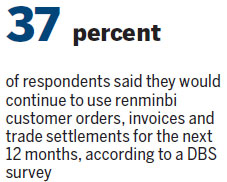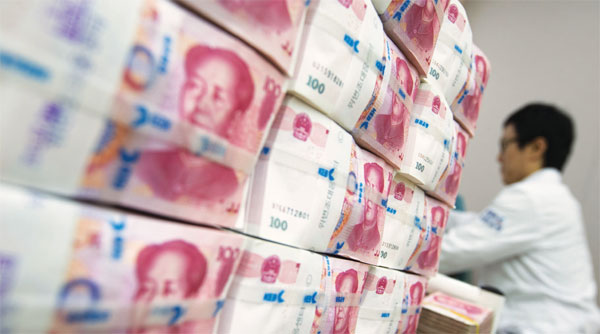RMB use in SAR tipped to shrink next year
Updated: 2015-11-10 07:54
By Emma Dai in Hong Kong(HK Edition)
|
|||||||||
|
Amid softening mainland economic growth and a possible US interest-rate hike, Hong Kong's economy is facing multiple challenges in the near term. Cho Seong-Joon / Bloomberg |
SMEs show lowest confidence in three years amid slowed growth on mainland
Despite stable usage of renminbi this year, Hong Kong companies' demand for the mainland currency, as well as the usage of renminbi products, are set to decline in the near term due to the lukewarm growth momentum across the border and the renminbi's depreciation prospects, according to a survey carried out by DBS Bank - Singapore's leading consumer lender.
The bank said it expects the weakest business confidence in three years among local small and medium-sized enterprises (SMEs), with nearly half of them pessimistic about business prospects for 2016.
"We expect the usage of renminbi to fall in the next 12 months in Hong Kong, due to falling orders, led by local business contraction and decelerating economic growth on the Chinese mainland," said Lily Lo, an economist at DBS Bank (Hong Kong) Ltd.
DBS interviewed more than 200 Hong Kong business owners and decision makers between Aug 4 and Sept 8 this year - 90 percent of them being SMEs. The poll found the DBS RMB Index "stable" in the third quarter of this year, with the latest reading edging down to 59.5 from 60.5 at the end of the previous quarter.
However, for the next 12 months, while 37 percent respondents said they would continue to use renminbi customer orders, invoices and trade settlements, 9 percent of them expect a decrease in renminbi usage for business, compared with 7 percent and 2 percent giving similar views in the second and first quarter, respectively.
As for using renminbi products in the coming year, 59 percent of those interviewed said they have no such plans, compared with 48 percent in the second quarter. The most popular renminbi product remains the foreign exchange spot, with one-third of respondents saying they would use it in the next 12 months.
But, the popularity of renminbi savings and check accounts slipped by 7 percentage points from a quarter ago to 3 percent in the latest survey, whereas 4 percent of respondents still plan to use renminbi-denominated structured investment deposits in the next 12 months - down 5 percentage points from a quarter ago.

Correspondingly, the survey found 51 percent of local businessmen foresaw renminbi depreciating against the US dollar by at least 2 percent, compared with only 20 percent in the second quarter of this year.
DBS' yearend target for the onshore renminbi exchange rate is 6.42 yuan per US dollar, down from 6.36 yuan per dollar onshore on Monday. Up to the third quarter of next year, it said renminbi would see a 2-percent downside against the greenback to 6.52 yuan per US dollar.
"Renminbi's softening outlook reflects growth deceleration in China. The fundamentals will continue to weaken for some time," DBS Bank economist Nathan Chow told China Daily, adding that the mainland's GDP growth rate will stay at 6.8 percent this year and retreat to 6.5 percent in 2016.
The survey also found Hong Kong's business community to be the most pessimistic on a one-year outlook in the third quarter since the end of 2012.
"The operational environment and performance of local business are deteriorating, particularly for wholesalers and retailers. Manufacturers are the most pessimistic," Lo said, adding that against the backdrop of an imminent US interest-rate hike, local property prices peaking, and decelerating growth on the mainland, Hong Kong's economy is facing multiple challenges in the near term.
DBS also predicted a 5 to 10-percent fall in local real-estate prices in the next 12 months, citing oversupply and a tightening credit environment.
emmadai@chinadailyhk.com
(HK Edition 11/10/2015 page8)
